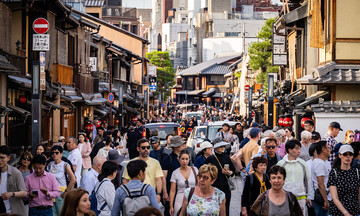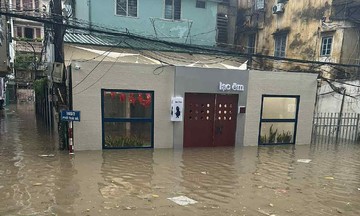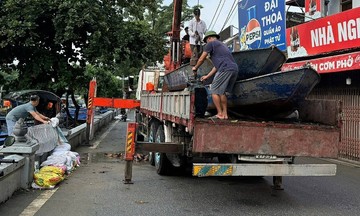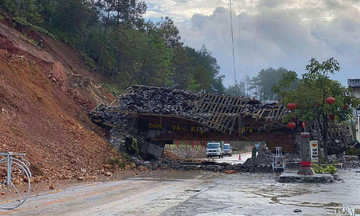From the second floor of the restaurant, he saw a crowd marching through the street, holding signs and chanting, "Gringos go home". Gringo refers to white tourists from North America or Europe who are not of Spanish or Latin American descent.
Palmero later learned that the protesters had smashed the restaurant's windows and damaged several cars, including the new car of the wedding organizer, a local resident of Mexico City, the capital of Mexico.
"They trashed her car, smashed the windows, broke the mirrors, and spray-painted the side. It was really bad," he said.
 |
A man argues with protesters outside a hotel in Barcelona, Spain in the summer of 2024. Photo: AFP |
A man argues with protesters outside a hotel in Barcelona, Spain in the summer of 2024. Photo: AFP
As a frequent traveler, Palmero knew that the influx of tourists had driven up prices in many areas of Mexico City, but he didn't expect residents to take to the streets in protest, similar to what he had read about Barcelona and other European cities.
According to Bernadett Papp, a senior researcher at the Netherlands-based European Tourism Futures Institute, protests against tourists have become increasingly common after the pandemic, as residents accustomed to a slower pace of life are now witnessing a surge in visitors, even exceeding pre-2020 levels.
Residents choose protests over policy advocacy because they are effective at attracting media attention and putting pressure on authorities to act. "In Barcelona and Amsterdam, protests have helped put tourism on the agenda," Papp said. However, fragmented tourism policies and a lack of a central point of contact make it difficult for residents to know who to talk to, leading to frustration and distrust.
Tatyana Tsukanova, a visiting professor at the EHL Hospitality Business School, notes that residents' reactions typically progress from tolerance to complaints, confrontation, and finally adaptation and change. During this process, tourists easily become "scapegoats".
In the summer of 2024, protesters in Barcelona threw objects, sprayed tourists with water guns and soda cans, strung ropes to block entrances to hotels and cafes, and chanted, "Tourists go home". Similar scenes played out in Mallorca, Venice, and Lisbon.
While tourists are easy targets, the root of the problem lies in policy, Tsukanova said. Research shows that direct confrontation makes some tourists feel unwelcome, but the impact is usually short-lived. In fact, after a series of protests in Spain in 2024, tourist arrivals to the country still increased by 4.1% in the first 7 months of 2025.
According to experts, protests raise awareness and can lead tourists to change their behavior, such as choosing hotels over short-term rentals. But in the long run, there is no evidence that protests reduce tourist numbers.
Many cities often react with piecemeal policies that are more symbolic than substantive, further fueling concerns and reinforcing negative perceptions of tourism.
To avoid the scenario of "a city for tourists, not for living", Lionel Saul, a lecturer at EHL, suggests tightening short-term rentals, imposing higher taxes on tourists, and involving local communities in tourism planning. Travel journalist Doug Lansky adds that the lack of residents' voices in decision-making will cause long-term damage to destinations.
"We want to experience these wonderful cultures, but we end up negatively impacting the very things we seek," Palmero said.
Anh Minh (CNBC)












